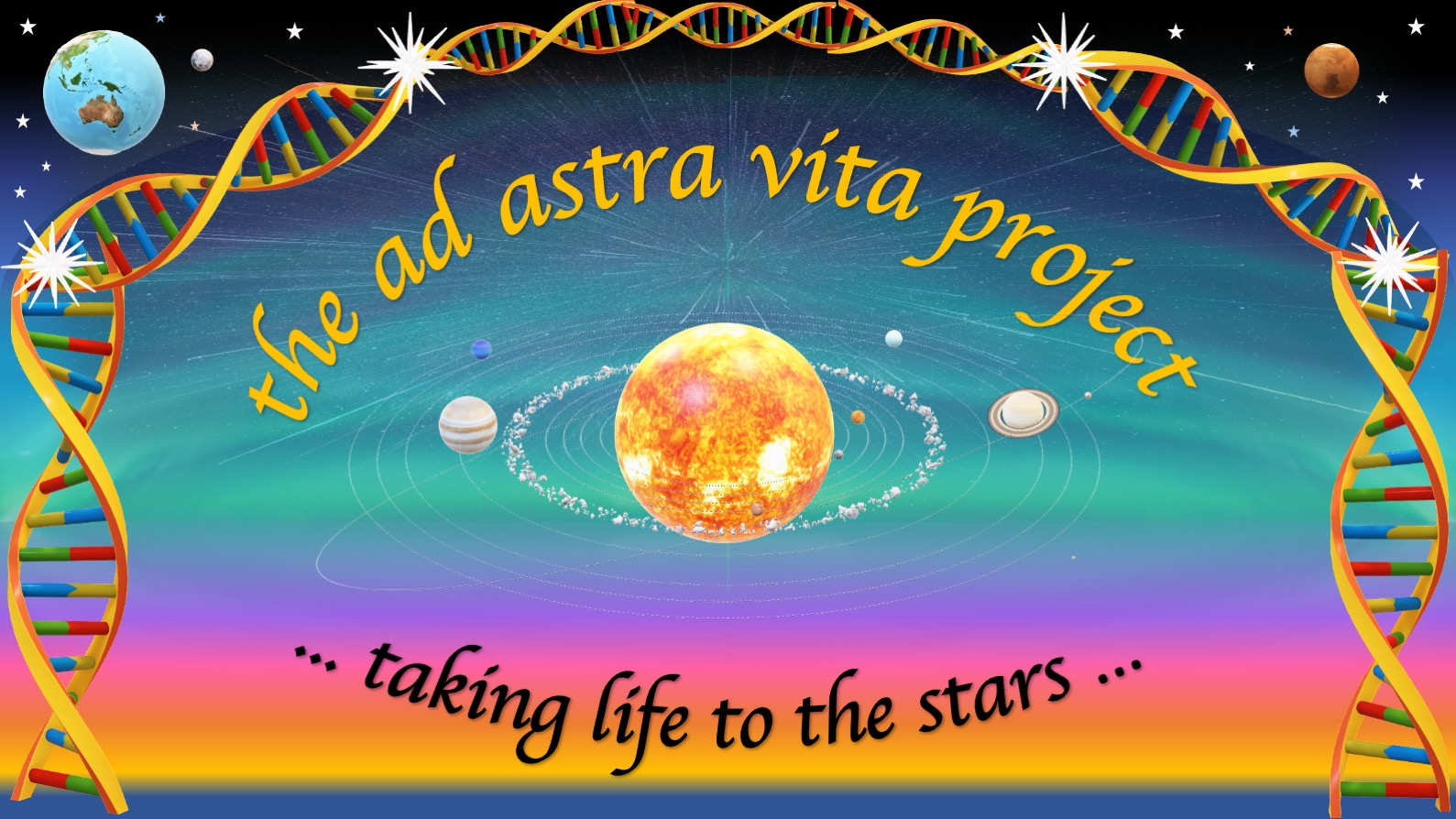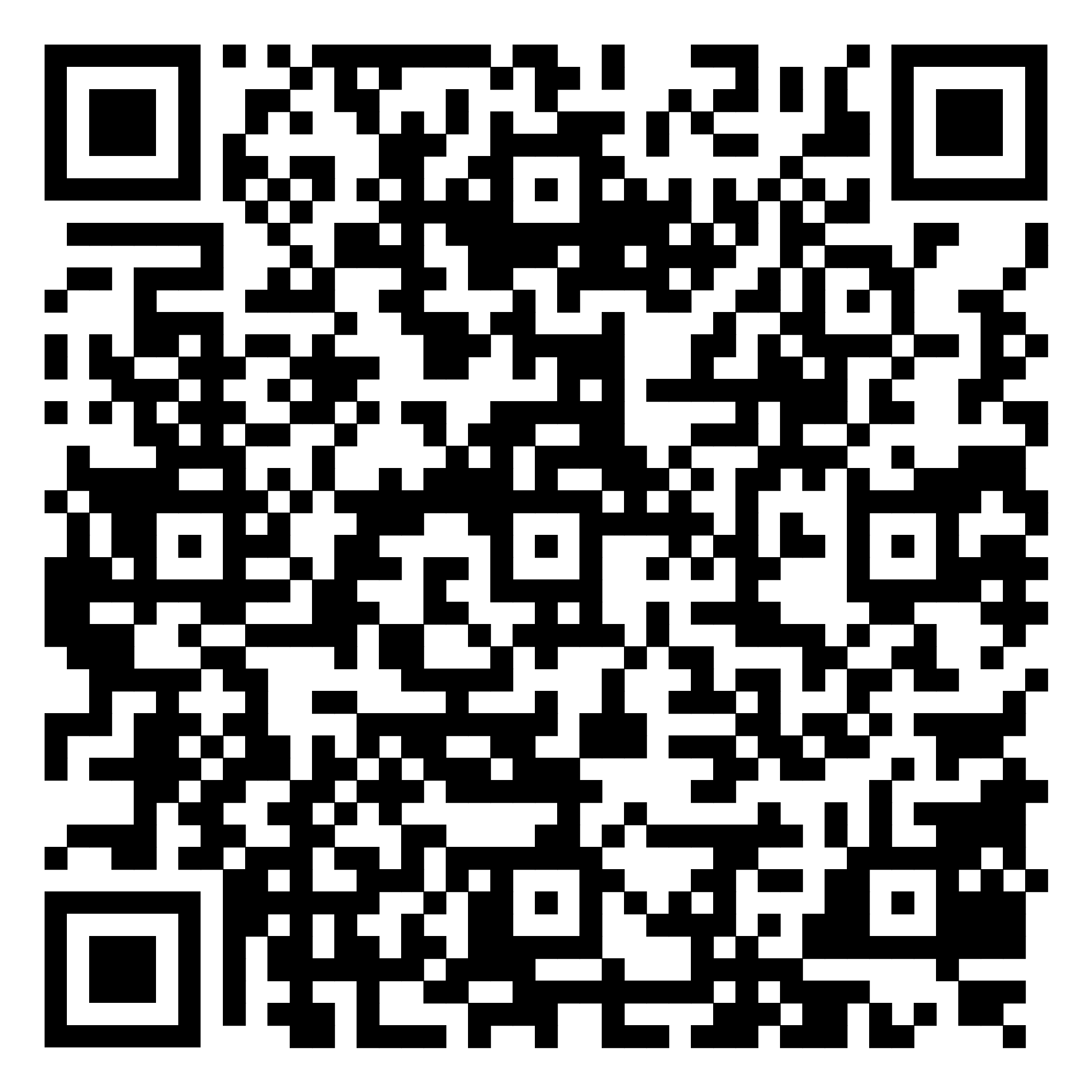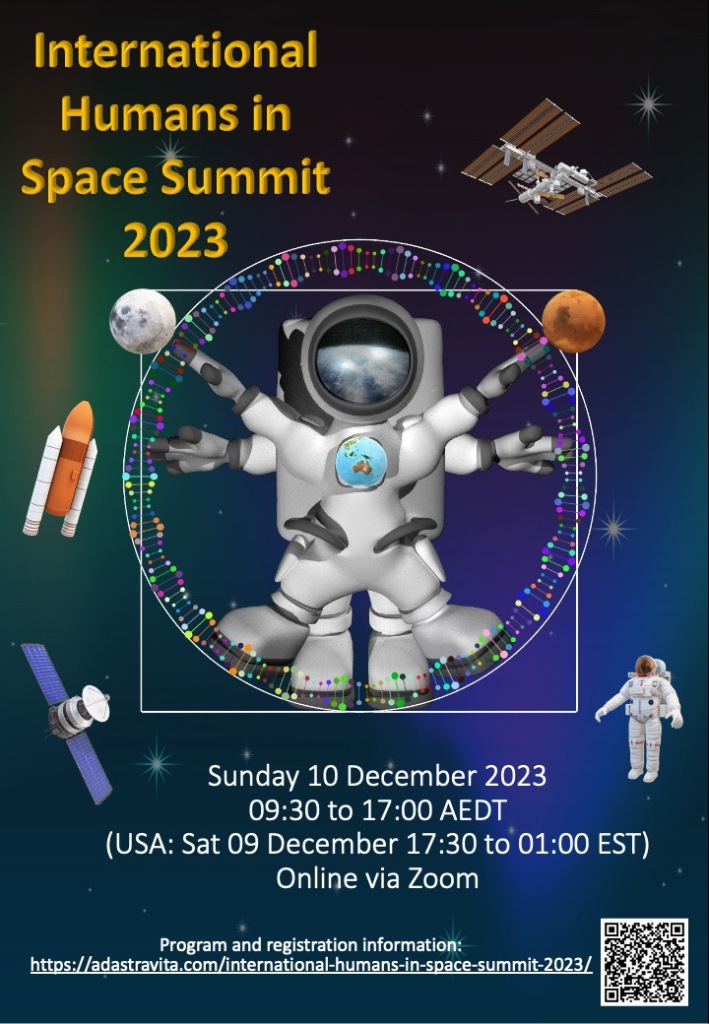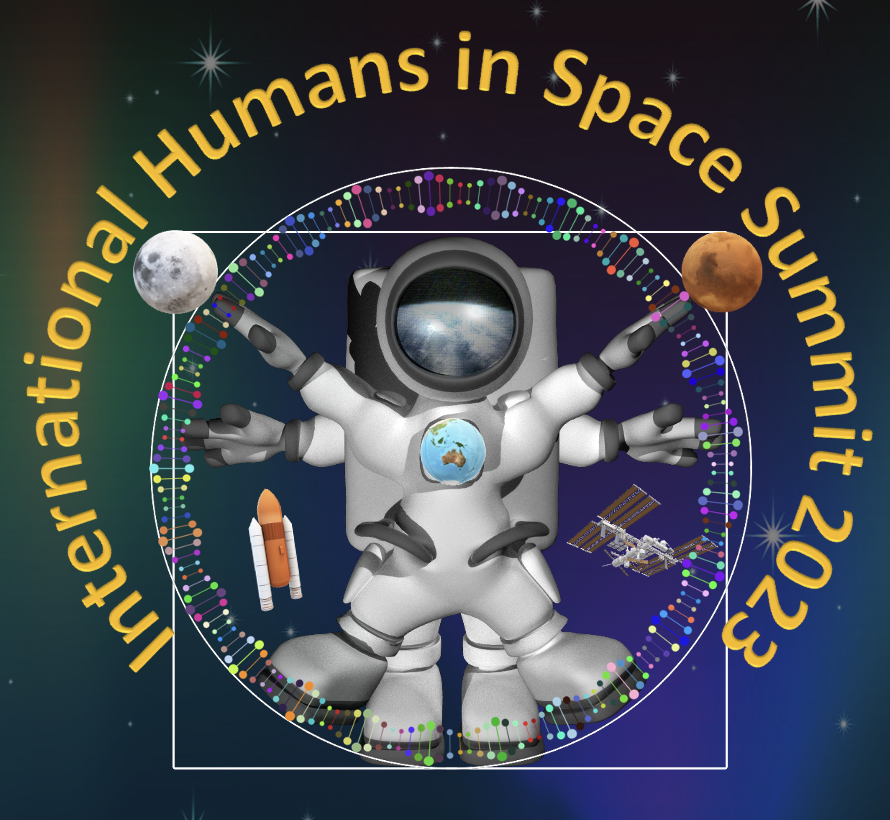
This year we are excited to bring you IHS 2023 as part of the new Melbourne International Space Festival. IHS 2023 will be fully virtual (via Zoom) over one day, and free for all registrants. We plan to bring you an exciting selection of panels from presenters in the US and Australia showcasing topics in the areas of space health, commercial spaceflight, remote medical care, human rights in space, and preparing for human exploration of Mars.
This year’s event will take place on Sunday 10 December (Australian time) from 09:30 to approximately 17:00 AEDT (schedule below). For those in North America, this will be the evening of Saturday 09 December. Check the time converter below or visit https://www.worldtimebuddy.com/ to find your time zone.
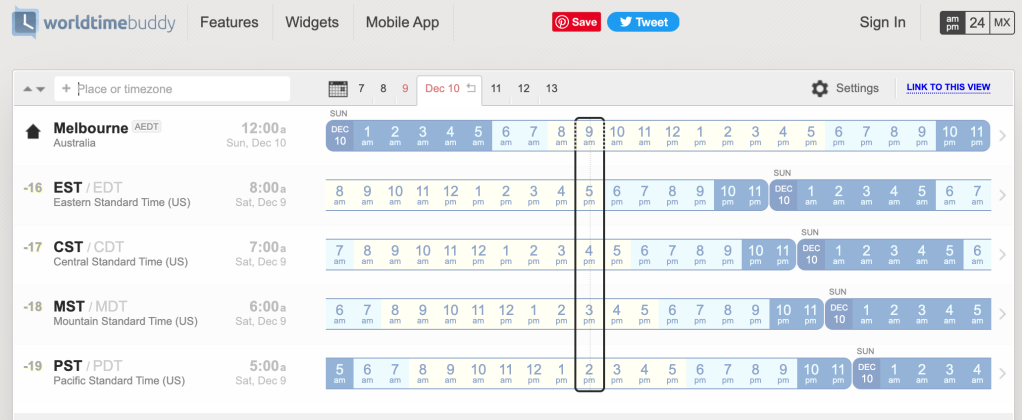
Even if you are not able to attend personally due to the time difference, we are planning to make recordings available (where presenters consent) on the ad astra vita project YouTube channel.
Program Outline
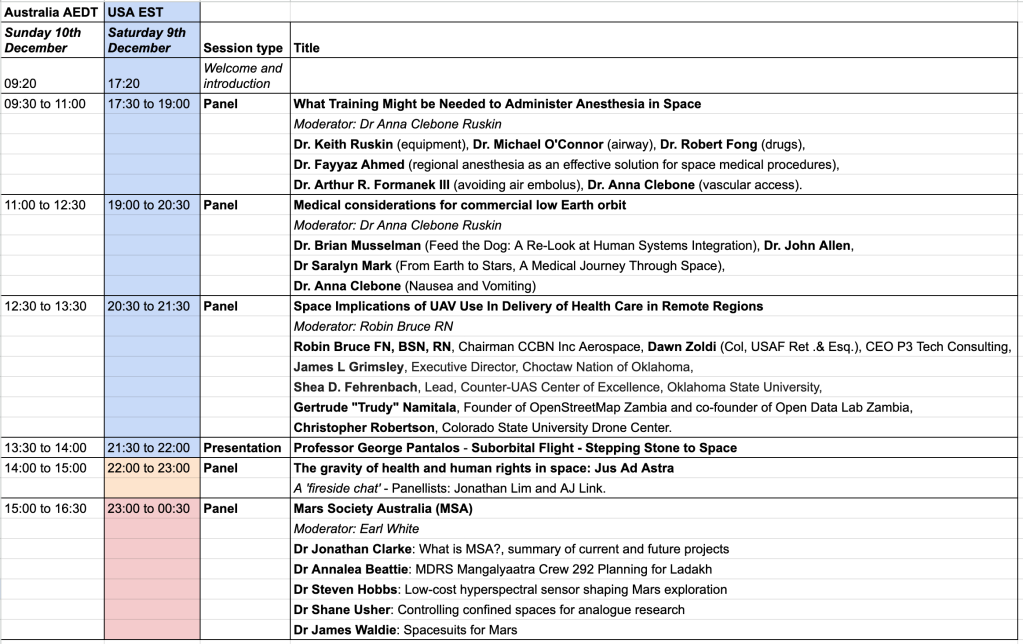
YouTube videos from IHS 2023
List our YouTube channel and playlist to view the videos from the Summit, and many more: https://www.youtube.com/playlist?list=PL4PAynk-yILssi39Zin-qOnKvSDnJrerh.
Panel 1: What Training Might be Needed to Administer Anesthesia in Space?
Panel 2: Medical considerations for commercial low Earth orbit
Panel 3: Space Implications of UAV Use In Delivery of Health Care in Remote Regions
Session 4: Professor George Pantalos – Suborbital Flight – Stepping Stone to Space
Panel 5: The gravity of health and human rights in space: Jus Ad Astra
Panel 6: Mars Society Australia (MSA)
Registration
In order to attend the Summit, all participants must register in advance. Register here to receive your personal Zoom link. Feel free to share the IHS 2023 poster or registration link with colleagues and friends who might be interested. You can download the poster below.
About the Summit
The 5th International Humans in Space Summit, previously the Australian Space Biology x Health Summit (ASBX), was established in 2019 with the vision to bring the international research and industry community together to bridge the gap between science, industry, and policy relating to the human exploration of space in a diverse and accessible manner that also serves to stimulate and support the interest of ‘the next generation’ in space-related careers. It has a philanthropic aim to help children and young people experiencing challenging circumstances, and this year is fundraising for the UNICEF Ukraine Emergency Appeal.
Due to the pandemic, the Summit was held online in 2020 and 2021, and was held in person in Sydney in 2022. This year, the virtual Summit will be the final event in the new Melbourne International Space Festival.
Thank you to our 2023 partners and participants
Presenters and friends from the Aerospace Human Factors Association
Presenters and friends from Star Harbor, Colorado, USA
Presenters and friends from CCBN, the Colorado Council of Black Nurses
Professor George Pantalos, University of Louisville
Presenters from Jus Ad Astra, the human rights in space project
Presenters from Mars Society Australia.
Special thanks are due to Dr Anna Clebone Ruskin, and Robin Bruce, FN, BSN, RN, for coordinating the first three US-based panels.
Dr Anna Clebone Ruskin, Moderator and Panellist
What Training Might be Needed to Administer Anesthesia in Space
Medical considerations for commercial low Earth orbit
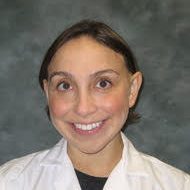
Dr. Anna Clebone’s research focuses on human performance in the operating room. She has worked on developing checklists for pediatric crisis management and regional anesthesia. Her work has been published in Pediatric Anesthesia, The Canadian Journal of Anesthesia, Current Opinion in Anesthesiology, the Journal of Clinical Monitoring and Computing, Anesthesia and Analgesia, and Anesthesiology. She also co-course directs an undergraduate class ‘Extreme Physiology’ at the University of Chicago.
She received a BA from Case Western Reserve University, and an MD from Mount Sinai School of Medicine. She completed an internship in medicine and pediatrics at Harvard Medical School, as well as residency training in anesthesiology at Yale School of Medicine, followed by a fellowship in pediatric anesthesiology at the University of Pittsburgh School of Medicine.
Dr Saralyn Mark, Panellist
Medical considerations for commercial low Earth orbit
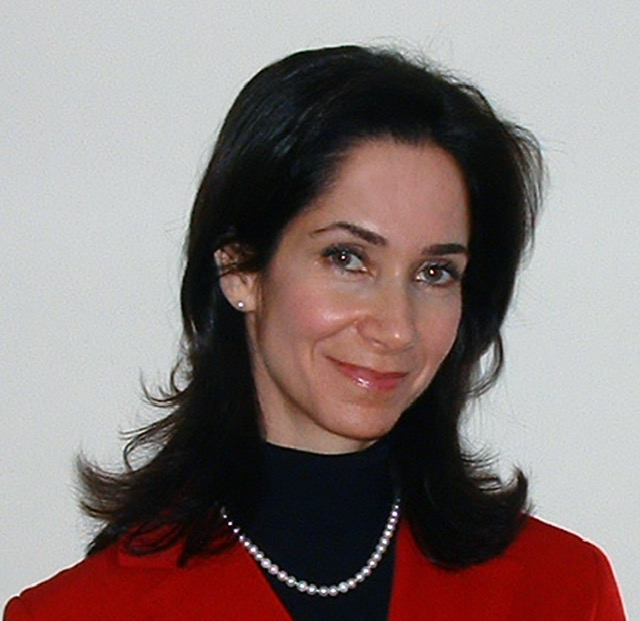
Space Medicine Physician, Author, Entrepreneur
Saralyn Mark, MD, an expert on space medicine and a world renowned leader in women’s health, is an endocrinologist, geriatrician and women’s health specialist. She is the Director for Health Innovation for STAR HARBOR.
As President and CEO of SolaMed Solutions, LLC, Dr. Mark has served as a medical and scientific policy advisor to the White House, NASA, HHS Office on Women’s Health, Gates Strategic Investment Fund, XPRIZE Health and Pandemic Alliance Brain Trust and other organizations dedicated to improving health on Earth and in space. She is also the President of iGIANT®, the only nonprofit accelerating gendered innovation in the world.
Dr. Mark holds 4 academic appointments including at Yale and Kings College-London in the Center for Human and Aerospace Physiology. Dr. Mark completed her residency and fellowships including designing the first women’s health fellowship at UCSF. She is author of Stellar Medicine: A Journey Through the Universe of Women’s Health which chronicles her adventures with the space program and her journey across all 7 continents which she incorporates into her podcast, Always Searching. She has published and delivered over 700 lectures and is a frequent health media expert including a monthly columnist for The Hill.
Dr. Mark was invited by the White House to testify about her work on precision innovation for the National Space Council which is led by the Vice President. She has received numerous awards including the NYU School of Medicine Alumni Leadership Award for her contributions to medicine, precision health and emerging technologies.
Robin Bruce, FN, BSN, RN, Chairman CCBN Inc Aerospace, Moderator
Space Implications of UAV Use In Delivery of Health Care in Remote Regions
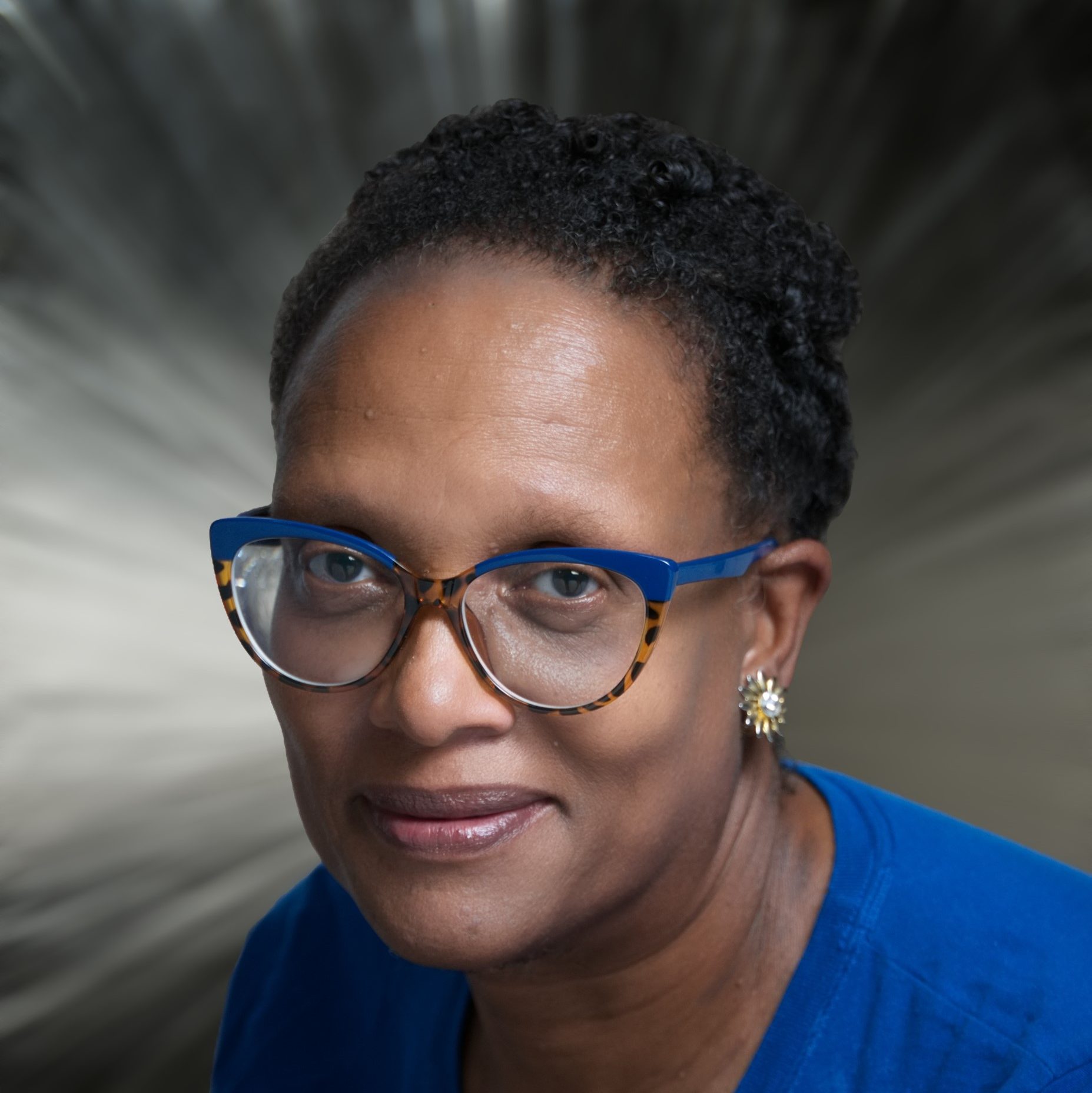
Robin Bruce FN, BSN, RN is an advocate for nurses in space and the urgency to address mental health in interstellar travel. As the Chairman of both CCBN Inc Aerospace, the Space Nursing arm of the Colorado Council of Black Nurses Inc(CCBN), and the CCBN Aerospace Nursing Department, Robin addresses interplanetary health care, employing Drone Nursing and Nurse Aviation as well as other aspects of Aerospace Nursing to realize how health maintenance of the total person – aka preventative, holistic health care – is vital to the success of life off Earth under conditions where medical supplies and resources are scarce. Robin has put her qualification as an aerospace nurse from the United States Air Force School of Aerospace Medicine to good use as evidenced by elections and appointments to theColorado Space Business Roundtable (CSBR) Board of Directors, Nurse-Physician Advisory Task Force for Colorado Health (NPATCH), American Institute of Aeronautics and Astronautics (AIAA) Life Sciences and Systems Technical Committee, and the AIAA Space Settlement Technical Committee. Grooming the next generation of space explorers, Robin spearheaded CCBN’s Junior Nurse Aviator and Jr Analog Astronaut programs, and chairs the CCBN Space Expo, a global initiative that brings the aerospace community across STEAM disciplines to inspire, encourage, and guide school-aged youth from all walks of life to see themselves as an integral part of the future of space. Robin’s 39-plus year nursing career has been centered around respiratory and immunology medicine, aeromedical evacuation, infection control (for which she received a USAF Commendation Medal), communicable disease management (including the 3 pandemics of tuberculosis, HIV/AIDS, and COVID-19), and clinical research, including Recombinant DNA (the forerunner of stem cell research) – all of which have marked space implications.
Dawn Zoldi (Col, USAF Ret .& Esq.), CEO P3 Tech Consulting, Panellist
Space Implications of UAV Use In Delivery of Health Care in Remote Regions
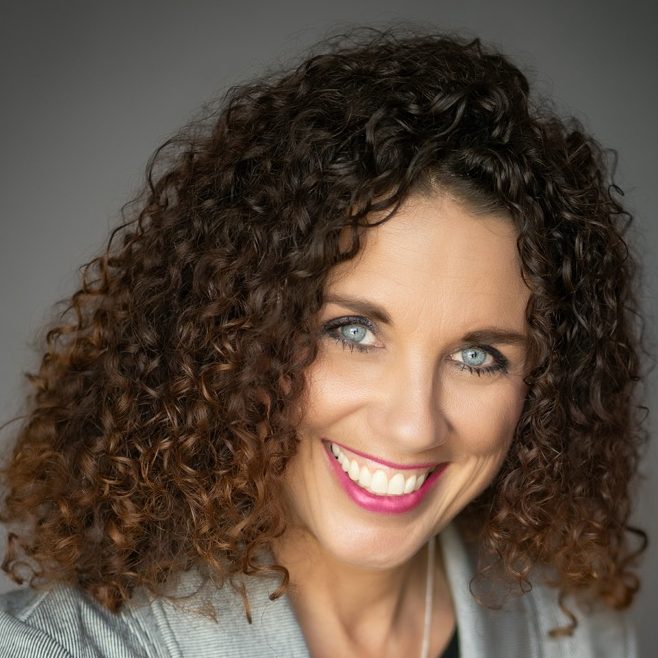
Dawn M.K. Zoldi (Colonel, USAF, Retired) is a licensed attorney with 28 years of combined active duty military and federal civil service to the U.S. Air Force and a Part 107 certified drone pilot. She is the CEO & Founder of P3 Tech Consulting and an internationally recognized expert on uncrewed aircraft system law and policy, featured in CNN, Forbes, and Newsweek and on the Public Broadcasting Service television network. Ms. Zoldi contributes to several magazines and hosts popular tech podcasts. In 2022, she received the Airwards People’s Choice Industry Impactor Award, was recognized as one of the Top Women in Aerospace & Aviation to Follow on LinkedIn and listed in the eVTOL Insights PowerBook. She is the author of the book Unmanned Aircraft Systems Legal and Business Considerations: A Modern Primer for U.S. Drone Programs. For more information, follow her on social media and visit her website at:https://www.p3techconsulting.com.
James Grimsley, Panellist
Space Implications of UAV Use In Delivery of Health Care in Remote Regions
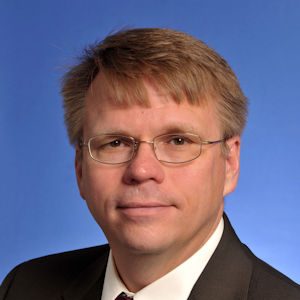
James Grimsley serves as the Executive Director for Advanced Technology Initiatives with the Choctaw Nation of Oklahoma and also serves as an Oklahoma Transportation Commissioner with oversight and governance responsibilities for the Oklahoma Department of Transportation. Mr. Grimsley currently serves on the Board of Directors for the Commercial Drone Alliance (CDA) as well as a variety of other boards and advisory groups. As part of Mr. Grimsley’s Choctaw Nation duties, he currently manages the FAA BEYOND Program (the Choctaw Nation of Oklahoma is the only tribal lead participant in the BEYOND program), and previously managed the FAA Integration Pilot Program (IPP) for the Choctaw Nation. In October 2022 U.S. Secretary of Transportation Pete Buttigieg appointed Mr. Grimsley to the FAA’s Advanced Aviation Advisory Council (AAAC). Mr. Grimsley has also served on multiple FAA Aviation Rulemaking Committees (ARCs) including the Beyond Visual Line of Sight ARC.
Mr. Grimsley’s undergraduate and graduate degrees are in aerospace and mechanical engineering, and Mr. Grimsley has more than 32 years of professional experience in the aviation and defense industries including corporate executive experience as well as being an Associate Vice President for Research at the University of Oklahoma. Most of Mr. Grimsley’s career has involved uncrewed aerial systems (UAS). Mr. Grimsley has published papers in both peer-reviewed engineering journals and law journals on issues related to drones and emerging aviation. Mr. Grimsley has also testified before Congress on aerospace innovation topics and has appeared multiple times before the Oklahoma legislature to discuss aerospace and aviation policy issues. Mr Grimsley was a speaker at the White House Advanced Air Mobility (AAM) Summit in August 2022. Mr. Grimsley has been a regular speaker at industry conferences and a commentator in the press since 2007 for drone and emerging aviation topics. jgrimsley@choctawnation.com.
Shea D. Fehrenbach, Panellist
Space Implications of UAV Use In Delivery of Health Care in Remote Regions
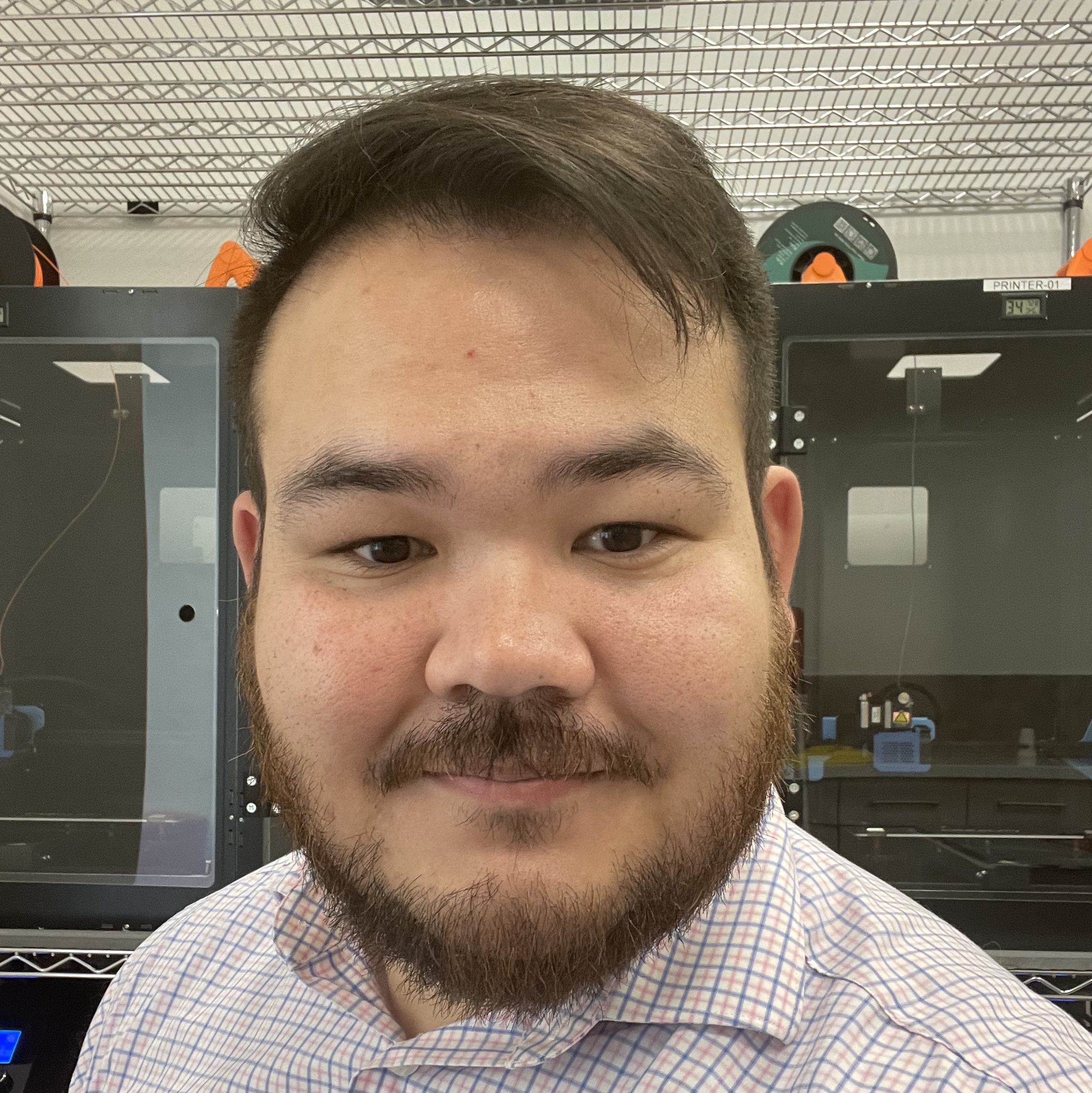
Shea Fehrenbach is a program manager at OSU’s Unmanned systems Research institute and the program lead for the Counter UAS Center of Excellence. Shea received a BS and MS in mechanical and aerospace engineering from OSU with a focus in Unmanned Aircraft Systems in 2014 and 2016 respectively. Shea’s early career focused in aero/mechanical design, test, and evaluation of sounding rockets, targets and countermeasures, and weapon systems development both CONUS and OCONUS. His current portfolio is comprised of efforts focused on testing, measurement, and experimentation of emerging Counter UAS technologies and methodologies, supporting the safe and effective integration of CUAS tech into both civil and military operations.
Gertrude “Trudy” Namitala, Panellist
Space Implications of UAV Use In Delivery of Health Care in Remote Regions
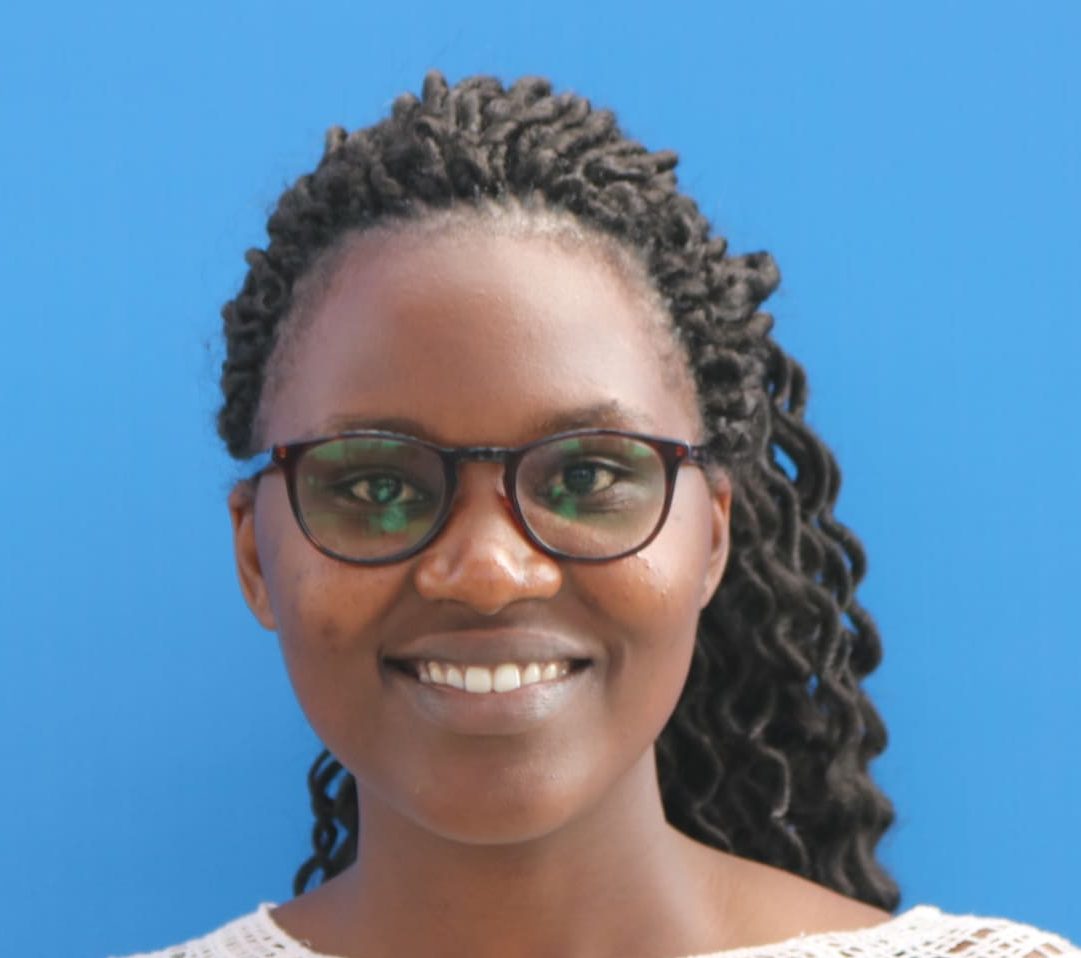
Gertrude Namitala is a GIS expert, ICT4D consultant, and a recognized open data advocate. She is the founder of OpenStreetMap Zambia (OSM), co-founder of Open Data Lab Zambia, and past Board member of the Humanitarian OpenStreetMap Team (HOT), an international team dedicated to humanitarian action and community development through open mapping for disaster preparedness, mitigation and response, and economic development. As a board member for HOT, Gertrude brought in strategic ideas that are being implemented in communities across the world. As one of the leaders of OSM Africa, a body responsible for promoting the mapping of the African continent, she leads the activation working group that is responsible for leading activations in any African country when disaster happens.She is also the chairperson for African Women in Energy and Power (AWEaP) in Uganda an organization designed to accelerate African women entrepreneurs’ participation in the power and energy sector. She is the vice-president of the Africa Council for Small Businesses and Entrepreneurship, an organization aimed at empowering small businesses in Africa and linking them to opportunities. A Rotarian and club president nominee, Gertrude has been a part of climate change innovations for her Rotary Club.
Putting her various IT and GIS certifications, and a Bachelor of Science in Information Technology from Amity University, India, to good use, Gertrude is also the technical director of Splac Innovations, a leading social enterprise that embraces the power of technology, data, and GIS to deliver positive change. She has developed and designed ICT tools both as an individual consultant and through Trudigital Technologies Ltd. As an individual consultant, she has worked with the World Bank, GIZ and other development agencies. Through OSM Zambia and Open Data Lab Zambia, Gertude promotes the use and adoption of open data and open data tools among organizations in Zambia. Passionate about developing women leaders and creating opportunities for women to be empowered, Gertrude is very well known in the open data community for advocating for diversity and inclusion of women in the open geospatial, open data, and open source world through avenues that include writing an article that is motivating girls and women to map around the world, organizing a mapping event to commemorate women, advocating for women to start mapping features that affect them, and hosting a children empowerment show on CBS and Beat FM in Uganda sponsored by Plan International.
Christopher Robertson, Panellist
Space Implications of UAV Use In Delivery of Health Care in Remote Regions
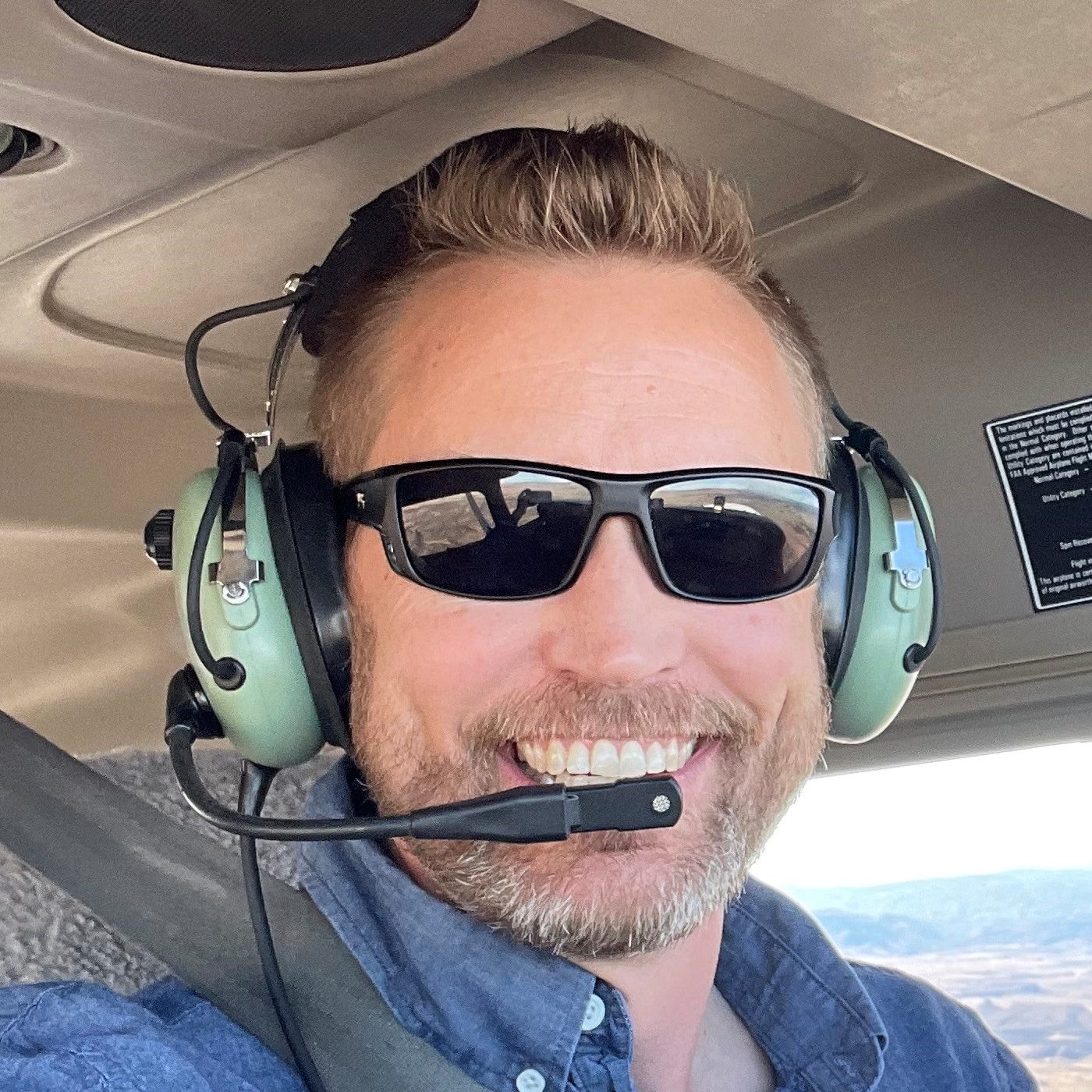
Christopher Robertson serves as the Director of the CSU Drone Center. He has been employed by Colorado State University for the past 23 years primarily with the Colorado State University Police Department. During his time at CSUPD he spent 16 years in the patrol division and 4 years in event security management. Christopher left the CSUPD in 2020 at the rank of Sergeant to become the full time Director of the CSU Drone Center. He is also an alumnus of Colorado State University. Christopher has been involved in UAS operations for the past 8 years and has experience with drones in both the public and private sector. He assisted in founding the Larimer County UAS Team which provides fire, police, and search and rescue drone services for Larimer County. Christopher has experience piloting sUAS for police, fire, SAR, GIS/remote sensing, methane detection, and scientific based missions. Christopher founded the CSU Drone Flight School and has helped over 900 people obtain their Part 107 FAA UAS certificate and learn the skillset to pilot drones. Christopher is a licensed FAA Private Pilot and a certificated Remote Pilot. Christopher has experience piloting multi-rotor, VTOL, fixed wing UAS, and traditional single engine airplanes. Christopher enjoys building, maintaining, and programing sUAS for variety of roles and applications.
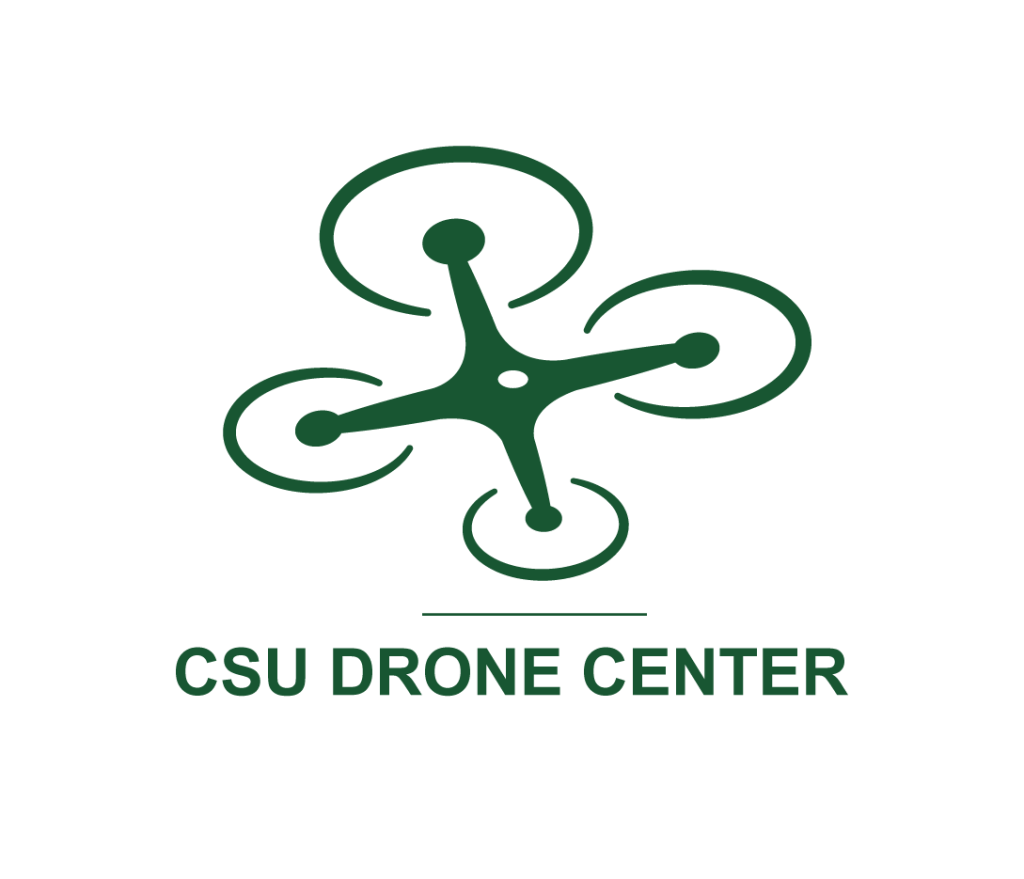
Professor George Pantalos, Presenter
Suborbital Flight – Stepping Stone to Space
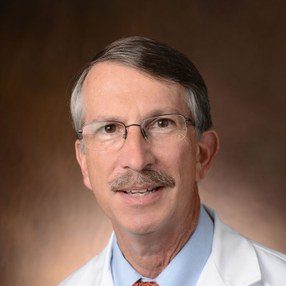
Dr George Pantalos has been a cardiovascular explorer for over 50 years. Much of that effort has included the development of surgical devices and procedures to make the research projects possible. He has been a Professor of Cardiovascular and Thoracic Surgery and Biomedical Engineering at the University of Louisville, in partnership with Jewish Hospital and Norton Children’s Hospital, since July 2000, after holding similar appointments at the University of Utah for 17 years. His efforts to investigate cardiovascular function have focused on understanding and treating heart failure with mechanical devices including artificial hearts, ventricular assist devices, and cardiopulmonary support systems which he has helped develop, test, and implement clinically in patients with two legs and with four legs, with big hearts and with little hearts.
George has also collaborated with NASA for many years helping to understand cardiovascular adaptation to the weightlessness of space flight and the return to Earth. George as flown 60 NASA-sponsored research missions on parabolic flight research aircraft and led the development of a cardiovascular diastolic function experiment – that included an instrumented artificial heart beating on a circulation simulator – that flew twice on the Space Shuttle Discovery. Other reduced gravity research projects have included delivery of effective chest compressions for CPR in 0-G, organ perfusion in 0-G, and the development of medical technologies for exploration space missions. The surgical fluid management system being developed by his project team just completed a successful suborbital spaceflight evaluation on the Virgin Galactic SpaceShipTwo. A suborbital flight with preserved red blood cells is planned for 2025.
Outside of his research, George enjoys supporting public and science policy efforts, traveling with his family, playing basketball and biking, being a weekend percussionist, volunteering with the American Red Cross, and making baklava. With his fellow students, staff, faculty, and patients, his motto has always been, “Share the adventure!”
Dr Jonathan Clarke, Panellist
Mars Society Australia Panel
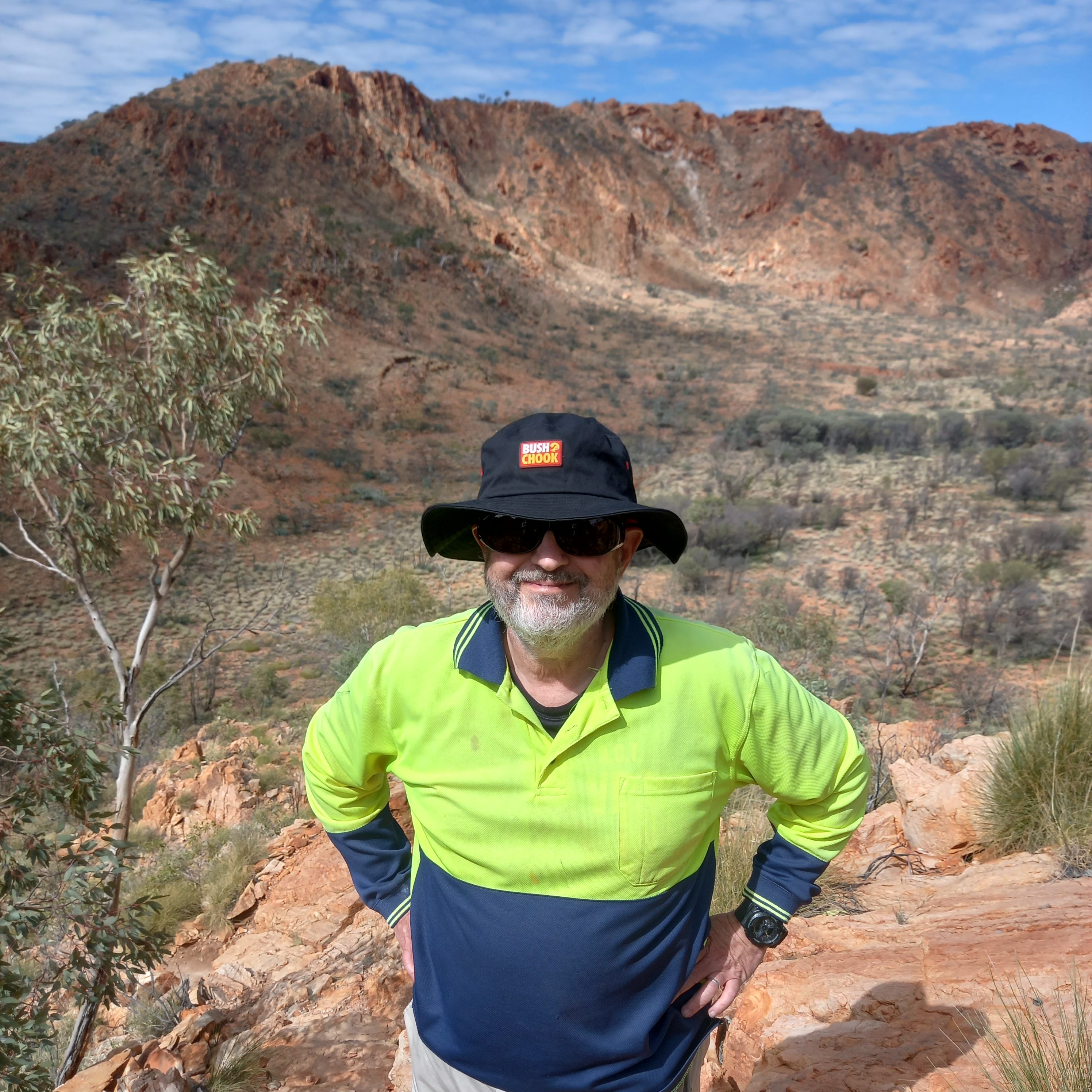
Dr Jonathan Clarke, BSc, PhD, spent 13 years in the resource exploration industry, working in field-based exploration projects across Australia, Chile, and the Philippines. He has been engaged in geosciences education programs at the University of Tasmania, Flinders and Latrobe Universities, and at the Australian National University. Jonathan spent 14 years working for Geoscience Australia in the marine survey, salinity, groundwater, and pre-competitive mineral exploration fields.
Jon has had a life-long interest in space exploration and planetary science. In 2001 he joined Mars Society Australia, becoming President in2012, a position he has held to the present. Jon has taken part in six Mars analogue expeditions in Australia and one each to Ladakh (India) and New Zealand. He has also participated in three rotations at the Mars Desert Research Station (MDRS) in Utah, and in the Mars 160 expedition at MDRS and Devon Island in the Canadian Arctic. Jonathan has been an associate of the Australian Centre for Astrobiology since 2004, an online instructor in astrobiology at Swinburne University (2017-2020), and an adjunct professor at the Amity Centre of Excellence in Astrobiology (ACoEA) in Mumbai since 2020. He currently works on MarsEVA suits as a systems scientist for Human Aerospace Pty. Ltd.
Jon has contributed to more than 100 peer reviewed publications in geosciences, analogue research, and astrobiology. Outside his professional career Jon has been a keen hiker and camper, off-road driver, recreational and research scuba diver, and is volunteer fire fighter with the Guises Creek Brigade in the Australian Capital Territory Rural Fire Service.
Dr Annalea Beattie
Mars Society Australia Panel
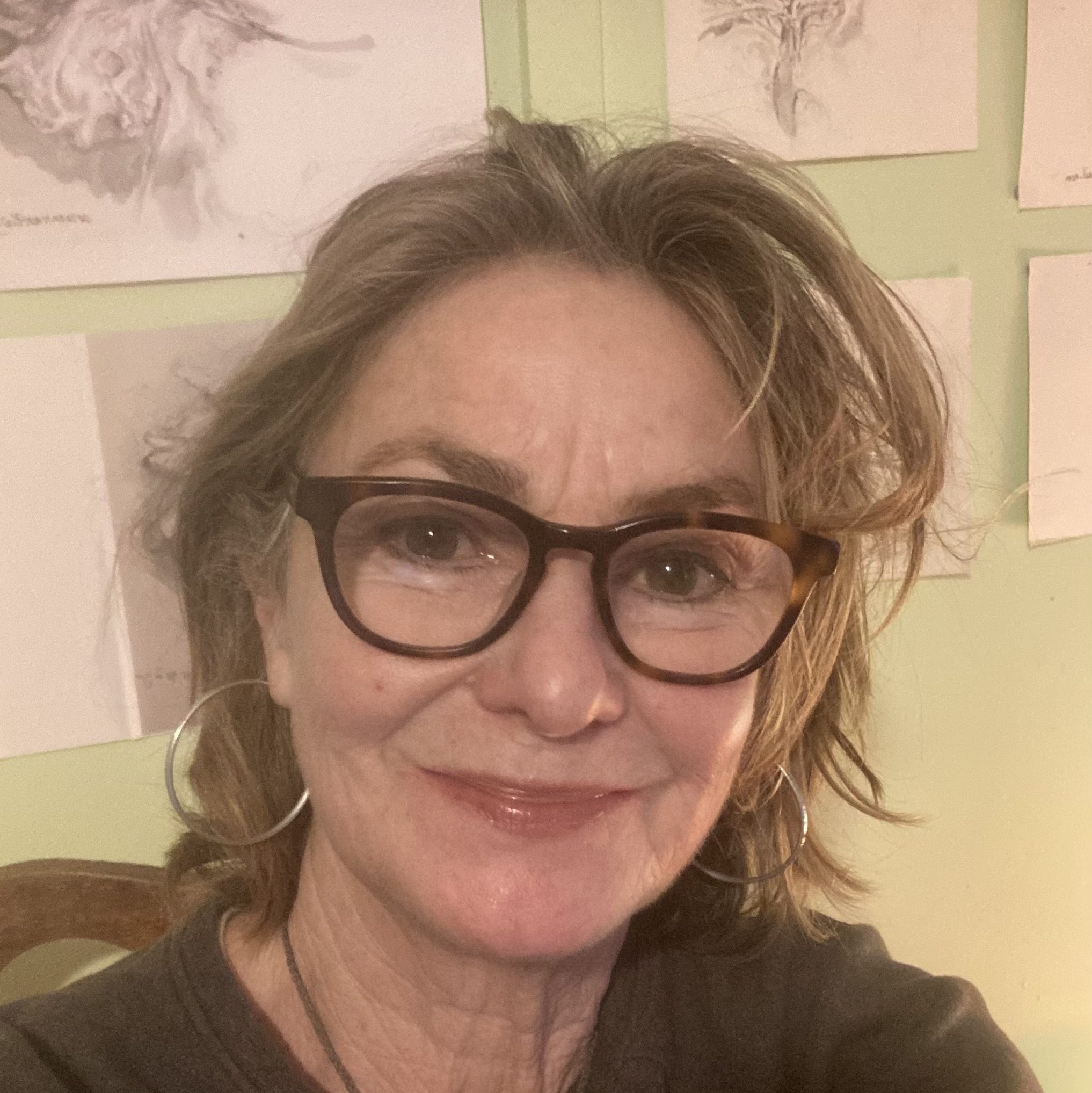
Dr. Annalea Beattie is an artist who is interested in the role of art and art making in long duration space travel. Based in space science, her practice considers how art making in Mars-like environments can contribute to thinking about how we might live in the future on other planets in confined, hostile and isolated circumstances that are not conducive to, but are in fact inhospitable to art making. On space simulations and space science expeditions, she works with scientists and technologists to explore how the experiences of making art might activate small, extraterrestrial communities, promote social cohesion, build rich, diverse, cultures and improve quality of life. Annalea has contributed to four Springer volumes on extraterrestrial liberty, speculating through her art practice how art making can invigorate communities off-Earth. She is an Executive Director of Mars Society Australia and a Director of the National Space Society of Australia. She is Adjunct Professor at the Centre of Excellence in Astrobiology, Amity University, Mumbai and a member of the Association of Mars Explorers.
Dr James Waldie
Mars Society Australia Panel
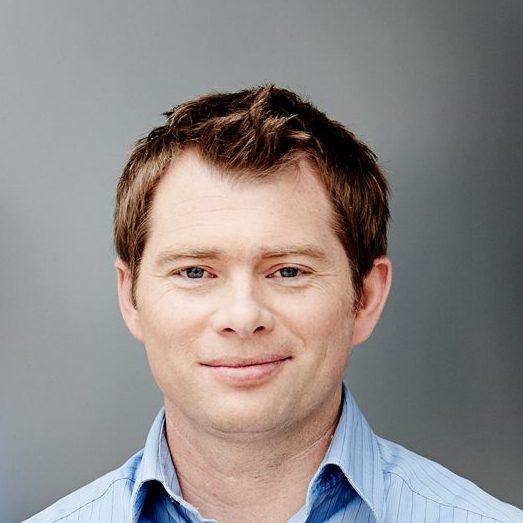
Dr James Waldie is an Adjunct Professor at RMIT, and the Co-founder of Cape Bionics and Human Aerospace. He has over 2 decades of experience in compression garments, including research appointments at the University of California and MIT. His bioastronautics work has concentrated on skinsuit design for spacewalking and as physical deconditioning countermeasures for astronauts during long duration spaceflight. He has been a consultant at the NASA Johnson Space Center, and was a Principal Investigator with the European Space Agency (ESA) on his Gravity Loading Skinsuit which was deployed to the Space Station in 2015 and 2017. Dr Waldie has also been leading an international programme to develop new skinsuits under an Australian Space Agency grant at Human Aerospace.
Dr Shane Usher, Panellist
Mars Society Australia Panel
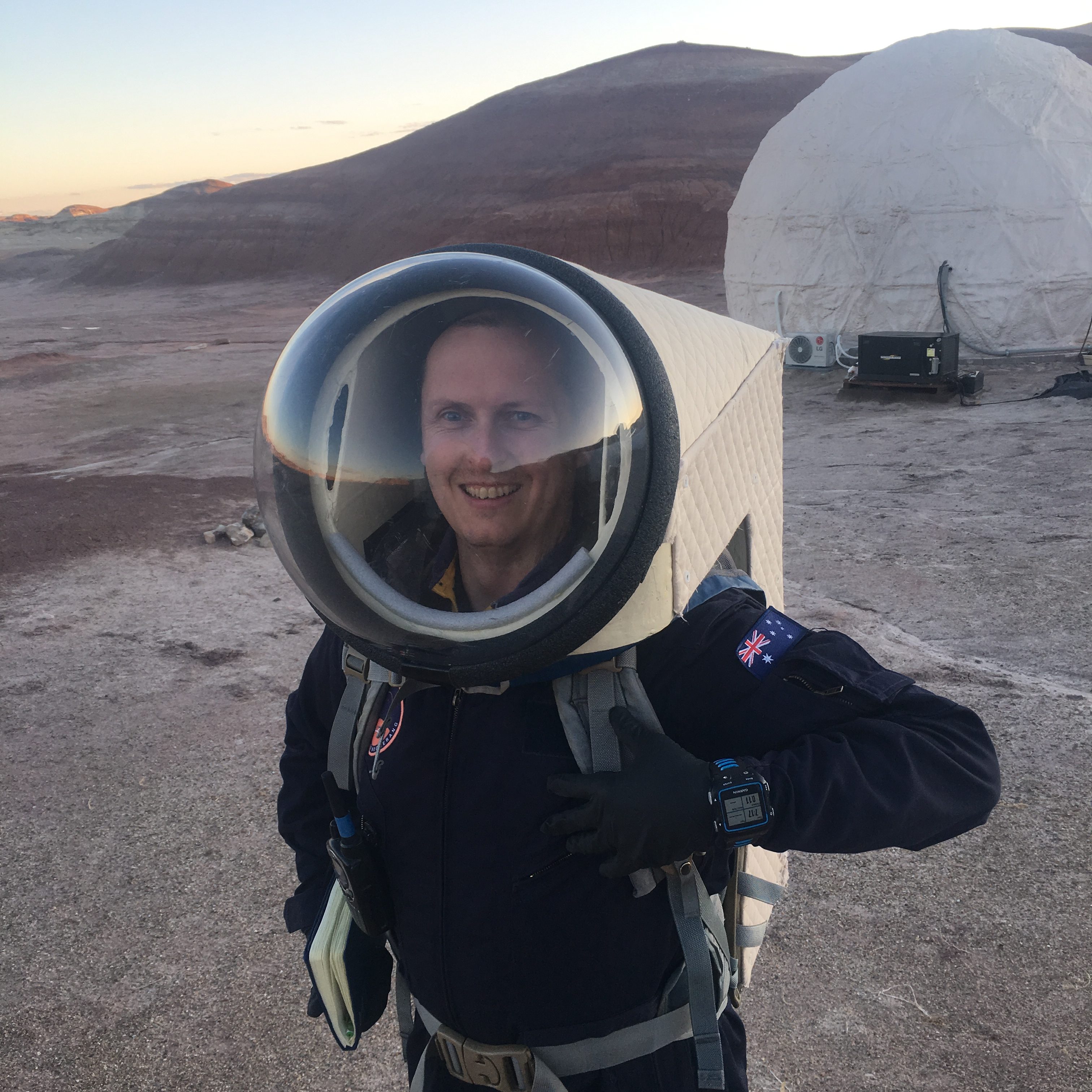
Dr Shane Usher is a Research Fellow in the Department of Chemical Engineering at The University of Melbourne. Shane has over 60 publications in technical journals and conference proceedings. Shane has expertise in solid-liquid separation processes such as sedimentation, centrifugation and filtration in mineral processing and wastewater treatment. He is involved in the development of non-sewered sanitation technologies for the 40% of the global population that is not connected to sewers in centralised wastewater treatment systems. Shane also has a keen interest in analogue space technologies, having participated in “Expedition Boomerang” at the Mars Desert Research Station in Utah and visited the Institute of Biomedical Problems in Moscow. He is currently developing his own controlled environment in a confined space the size of a shipping container to improve understanding and lower the barriers to entering the space industry.
Dr Steven Hobbs, Panellist
Mars Society Australia Panel
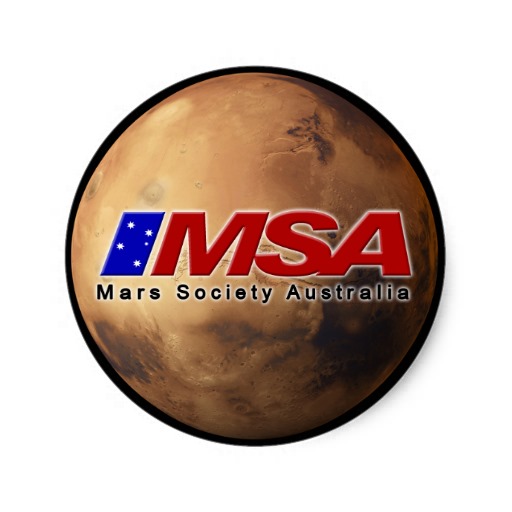
Dr Steven Hobbs has a Master’s in Space Systems Engineering with a focus of developing hyperspectral sensors for deep space applications. Coupled with his PhD in Geographic Information Systems and Remote Sensing, he has actively researched and published on Martian geomorphology, Earth-based analogues and surface processes. Additionally, Steven is investigating the utility of low-cost sensors and robotics, testing them in near-space environments, to inform the next generation of Moon and Mars exploration.
Earl White, Moderator
Mars Society Australia Panel
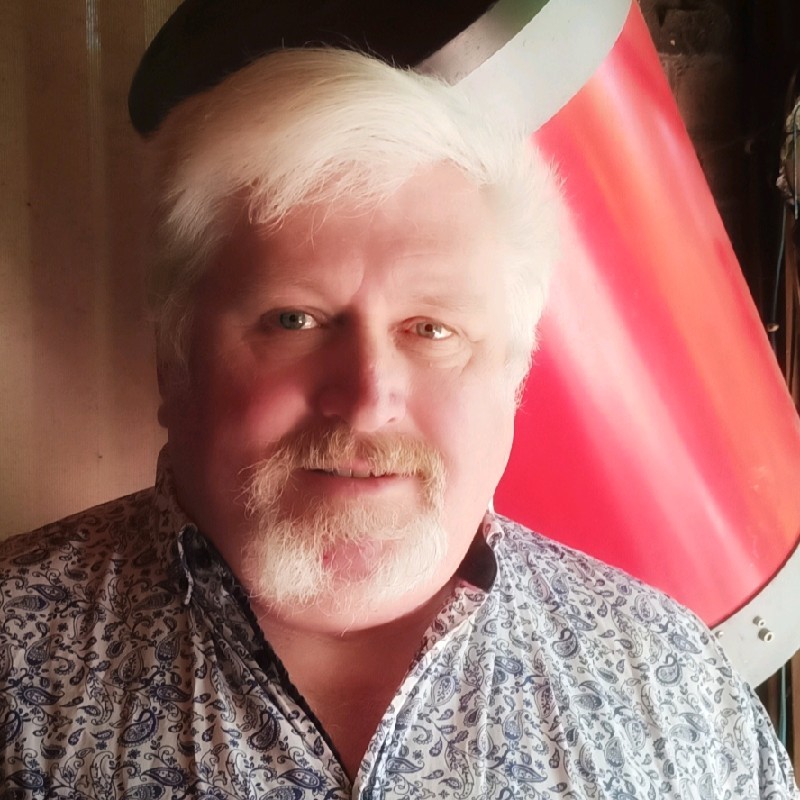
Earl was scared witless watching the original “The War of the Worlds” movie as a small child and has been in love with Mars, astronomy and B-grade movies ever since.
A life long astronomer and a member of the MSA the since 2016, he originally studied computer science at university after leaving school and then embarked on a multi-decade long career in the Australian IT industry. After moving from front-line hardware customer service and support through to management roles in that area, he made the switch to sales and marketing in the 90’s just as the Internet became part of our daily lives. Earl was heavily involved in running a number of leading US and Australian software companies offering CRM, B2C and B2B e-commerce, cloud and ERP solutions.
He continued with studies in a range of fields and obtained post graduate qualifications in astronomy from Swinburne University. Since 2020 he’s been the Customer Communications Manage for The Binocular and Telescope Shop (BINTEL) in Sydney, which is the southern hemisphere’s largest supplier of astronomical equipment. Part of this role at BINTEL is producing their weekly e-newsletter which is read by tens of thousands of keen astro and nature fans around the world. Earl has a strong interest in astronomy based research and is working on MSA projects involving amateur astronomers imaging Mars. Earl’s few remaining moments of spare time is spent planning additions to his collection of space and sci-fi themed tattoos and wrangling his three Chihuahuas.
Original Founders of the Summit
Dr Rowena Christiansen, the University of Melbourne
Dr Joshua Chou, Explor Biologics
Dr Christine Mehner, Mayo Clinic (USA)
How to get involved
- Share our poster with others who might be interested
- Zoom registration form
- Visit the SpaceFest 2023 page to see if there might be other events you are interested in
- Fundraising for the UNICEF Ukraine Emergency Appeal: https://ukraine.unicef.org.au/t/ihs2022
- Any questions? Email the team via: contactus@adastravita.com.
